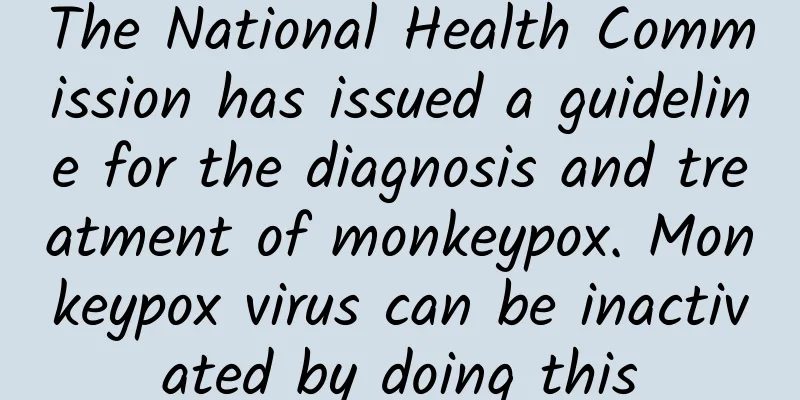For the baby's health, the doctor inserted a foot-long silver needle into my stomach

|
My husband and I were the first "dual-only family" eligible for the two-child policy, but we kept hesitating and procrastinating between wanting to have a two-child policy and between work and life, until I was 36 years old, when I finally got on board. As someone who has been through this before, I was much more relaxed when I was pregnant with my second child. I ate and drank as I should, and had a very good attitude, thinking that everything would be smooth sailing - of course, I was soon slapped in the face. Sudden bad news This time, the doctor who attended my routine prenatal checkups was the professor who delivered my first child. Everything was arranged with peace of mind. The entire pre- and mid-pregnancy period was quite smooth. I passed the NT test, non-invasive DNA test, and major fetal anomaly screening all at once. It was like this until the 23rd week, when I had another routine B-ultrasound. After the examination, the ultrasound doctor did not give any special suggestions. I looked at the list and one of the items showed "enhanced intestinal echo", but it was not mentioned in the conclusion. As usual, regular check-ups were required. I didn't pay much attention to it. It was almost noon and the professor who did the pregnancy checkup had already gone off work. I wanted to wait until the next checkup before showing it to her. It turned out that I was really careless. Wuhan in July was like a furnace. I was saved by the air conditioner. Maybe the temperature was set too low. I started to have a sore throat and cough after using the air conditioner all night. After two days, I coughed so much that I couldn't fall asleep. I went to the internal medicine department of a tertiary hospital. I thought since I was in the hospital, I might as well listen to the fetal heart rate. So, I made an appointment with the obstetrics department. I took out the results of my last B-ultrasound. Unexpectedly, the doctor here immediately confirmed my age after looking at it. When she learned that I was 36, she told me directly: For elderly mothers over 35 years old with enhanced intestinal echoes, amniocentesis is recommended. I was stunned. I came here to have a cough and listen to the fetal heart rate. Why did I suddenly need to do amniocentesis? If it was really that serious, why didn't the ultrasound doctor warn me at the beginning? I left the hospital half-believing and half-doubting, and started searching the Internet frantically. The answer I got was: "Enhanced intestinal echogenicity, as an ultrasound imaging manifestation, may be caused by meconium. Most fetuses end up being normal, but some fetuses are confirmed to have chromosomal abnormalities, intrauterine infections, intestinal obstruction, etc." It was like a bolt from the blue! I held back my tears and sent the ultrasound report to my pregnancy checkup professor. As a well-known "knife", she has always been straightforward and decisive. This time she also replied to me briefly and clearly with two words: "It's okay." I put my heart at ease for the time being, and I will consult the doctor in person at the next pregnancy checkup. Uncertain probability problem Finally, the time for the scheduled prenatal check-up arrived. The professor still advised not to do amniocentesis because my NT and non-invasive tests were all passed, my family history and previous pregnancy history were also normal, and the possibility of chromosomal abnormalities in the fetus was very small. Amniocentesis itself is an invasive test with a possible 1% miscarriage rate. If something unexpected really happens, it will not be worth it. I was still confused, and the professor suggested that I should look into eugenics. The advice given by the eugenics department is similar. The doctor told me that the detection rate of enhanced intestinal echo is actually quite high (about 6% from what I found online), but the final visit results showed that it was basically caused by meconium and other reasons. He also felt that according to my situation, the results of amniocentesis should be normal, so there was no need to do it. "As long as the chromosomes are normal, intestinal malformations are minor problems that can be corrected." ...Why is the doctor so rude? Am I unsophisticated? I cannot accept intestinal malformation. With my doubts still unsolved, I went home and started a new round of frantic searching. I searched all kinds of websites and forums, and all kinds of pregnancy apps, and I didn't miss any topic related to enhanced intestinal echoes, calculated various probabilities, and asked mothers who had similar experiences about the final results... Seeing me going crazy, my husband was very calm and firmly believed that the baby must be normal. His logic was very crude: although you are 36 years old, your physical and mental development has always been relatively late (yes, I am the amazing woman who grew 5 cm after entering college), so you can't be considered an elderly mother, and the increased echo of the intestinal tract is just a small bug... This unconventional explanation made me laugh and cry, but it was futile to comfort her. Finally, we agreed to spend a huge amount of money (300 yuan registration fee) to consult a famous professor of obstetrics and gynecology, and let his opinion be the final word. A foot-long silver needle was inserted into my belly. I went to the hospital alone on the day of the consultation. The doctor was very kind and patient. After reading all the examination data in detail, he finally gave me the suggestion of amniocentesis. He said very pertinently: "NT and non-invasive tests are only probabilistic screening methods. Only amniocentesis can confirm the diagnosis. In the case of advanced pregnancy with enhanced intestinal echo, the probability of chromosomal abnormalities increases exponentially. Even if there is only a 1% chance, we must rule it out 100%. This is the purpose of eugenics." He comforted me that there are more than thousands of similar operations here every year, and the accident rate is less than one in a thousand. After listening to the expert, I stopped worrying and went to the hospital that afternoon. The best time for amniocentesis is 16-22 weeks of pregnancy, during which time there is more amniotic fluid, the fetus is of suitable size, and has more room for movement. It can usually be done in an outpatient clinic. Considering that I was already 24 weeks pregnant and the fetus was large, I decided to have the surgery in the hospital for safety reasons. On the day of hospitalization, I had 16 tubes of blood drawn. After the blood was drawn, I felt dizzy. The nurse comforted me softly, saying that it was less than 50 ml. I felt even more dizzy after hearing that... In short, I finished all the tests that I had done recently and hadn't done before. It was already evening. I couldn't help but look up some cases about amniocentesis, such as pricking the baby and postoperative infection. The most exaggerated case was that the needle for drawing amniocentesis was grabbed by the fetus. Oh my god, I was so nervous that I couldn't sleep all night. The next day after lunch, the nurse gave me an injection of magnesium sulfate to suppress uterine contractions. There was only one bag of medicine, but it dripped very slowly. It was said that it would take 24 hours to finish dripping. At 3 o'clock, I was suddenly notified that I had to go for surgery. At that moment, my mood calmed down instead, and I felt calm and resigned to my fate. There were no beds or wheelchairs, so I pushed the infusion stand by myself and followed the nurse out the door, into the elevator, got off the elevator, turned a corner, and turned another corner, and arrived at the operating room, oh no, actually it was the place for the B-ultrasound. This is too simple, but I comforted myself that this just proves that it is just a small case and it will be fine. There were two doctors in the room, one doing ultrasound and the other doing surgery. I lay on the examination bed, exposing my entire abdomen. After thorough disinfection, the ultrasound doctor rubbed the probe back and forth on it, looking for a gap to insert the needle. After more than ten seconds, she pressed a point on the upper abdomen and said, "Here is it. The fetus is now facing outwards, so there is not much room for operation. There is a gap here." Is it decided? I couldn't help but ask softly, my heart filled with fear. Don't I have to keep the needle under the guidance of the probe? What if the baby moves now? No one paid any attention to me, weak and helpless. The surgeon said, "Don't move." I quickly controlled my body with all my strength and closed my mouth. I watched the doctor take out a foot-long silver needle and thrust it into my belly quickly and accurately. I don't know if it's because the nerves in my belly are thicker, but it didn't hurt as much as a shot in the buttocks, but it was scary enough. I didn't dare to move until the doctor pulled out the needle and saw the bottle of pale yellow amniotic fluid. After that, I was disinfected and bandaged, and I pushed the IV stand back to the ward. The next day, after the magnesium sulfate drip was finished, I was discharged from the hospital. What was the final result? Just as the doctor predicted, the examination results were all normal. In the fall, the baby was born safely with an Apgar score of 10. On the same day, the baby passed a lot of green meconium, and the intestinal problems were completely eliminated. It seems that the "intestinal echo enhancement" was probably caused by the accumulation of meconium due to his drinking too much amniotic fluid - it was this glutton that made me have to get an injection. Doctor's comments Zhang Lu | Attending Physician, Department of Obstetrics and Gynecology, Fudan University Affiliated Obstetrics and Gynecology Hospital Amniocentesis, the full name in medicine is amniocentesis. In layman's terms, the operation process of amniocentesis is actually similar to venous blood drawing: first disinfect the skin, then find the puncture point with the help of B-ultrasound, insert the needle, draw some amniotic fluid, and then pull out the needle. Because the uterine muscle layer outside the amniotic fluid is relatively thick, there is no need to worry about the amniotic fluid overflowing from the "needle hole" after puncture. Thinking about it this way, amniocentesis does not seem so scary. As a prenatal diagnosis method, the advantages of amniocentesis are obvious: the chromosomes of the fetus can be directly extracted from the fetal cells in the amniotic fluid. Therefore, this method is the "gold standard" for diagnosing fetal chromosomal diseases. The disadvantage is that the puncture may bring risks such as intrauterine infection and miscarriage. However, under current technical conditions, the safety of amniocentesis is generally very high. In some hospitals, the risk of miscarriage and infection caused by puncture is less than 0.1%, which is a "low-probability event." Therefore, under appropriate circumstances, the benefits of amniocentesis may far outweigh its risks. Although amniocentesis is very safe, it does not mean that everyone should do it. Combined with previous data, doctors only recommend amniocentesis when the fetus is assessed to have a high risk of chromosomal abnormalities. These situations include: Older mothers (over 35 years old); Both spouses have a family history of genetic diseases; Adverse pregnancy and delivery history (previous history of giving birth to a malformed fetus or a fetus with chromosomal abnormalities); Serological screening indicates a high risk of trisomy 18 or trisomy 21; Non-invasive DNA testing revealed fetal chromosomal abnormalities; Ultrasound revealed fetal malformation or thickening of NT and NF; Pregnant women conceived through third-generation IVF technology. Some of these situations are high-risk factors, some are high-risk factors, and some are medium-risk factors. For our author, the pregnant woman is 36 years old, B-ultrasound shows strong intestinal echoes, and non-invasive DNA shows low risk. It should be said that the risk of fetal chromosomal abnormalities after birth is slightly increased, but not very high. However, compared with this, the risk of amniocentesis may be lower. In this case, amniocentesis is still recommended. Of course, because the author has been struggling for a while, she may miss the best time for amniocentesis. Usually, amniocentesis is more suitable for the second trimester, and pregnant women are advised to follow the doctor's advice and do every necessary pregnancy checkup. Sharing of personal experiences does not constitute medical advice and cannot replace the doctor's individualized judgment on specific patients. If you need medical treatment, please go to a regular hospital. Author: Fei Edit: Decapoda Hyalidae |
<<: What is the best month to visit Phuket? What snacks are there in Phuket? What are the best ones?
>>: For the sake of happiness, I decided to complain about my boss in my circle of friends tonight
Recommend
Does abortion require general anesthesia?
I believe that many women have had the experience...
What is the reason why girls have strong body odor?
If girls have a strong body odor, the impact will...
What causes lower back pain in women?
Women are always weaker than men, and many women ...
When guests arrive, the heart is always warm, and when guests leave, the tea is still hot - drinking 2-3 cups of tea a day can significantly reduce the risk of venous thromboembolism. You can add milk, but never sugar.
Venous thromboembolism (VTE), including deep vein...
The tragedy of syphilis patients, the apology of the US president, and the extremely immoral Tuskegee experiment
Author: Digoxin On the afternoon of May 16, 1997,...
Tips for removing pregnancy spots on the face
Having spots on the face is something that no wom...
How long does it take for induced labor to last?
During the delivery process, pregnant women may e...
What are the dangers of having sex before abortion?
We may be more aware of the dangers of having sex...
How long does it take to feel an ectopic pregnancy?
Many women experience ectopic pregnancies during ...
What should I do if the gestational sac is on the right side during pregnancy?
When a woman is pregnant again, the fertilized eg...
What is the grading of breast masses?
Breasts are extremely important to women. They ar...
Is it normal to still have blood clots on the seventh day after medical abortion?
For women who accidentally become pregnant, choos...
How to maintain ovaries
It is well known that ovaries are very important ...
What to eat to detoxify dark yellow skin
A dark yellow complexion is very annoying. Dull a...
Please keep the knowledge of infectious disease prevention in spring 2025~
Spring is the season when infectious diseases are...









